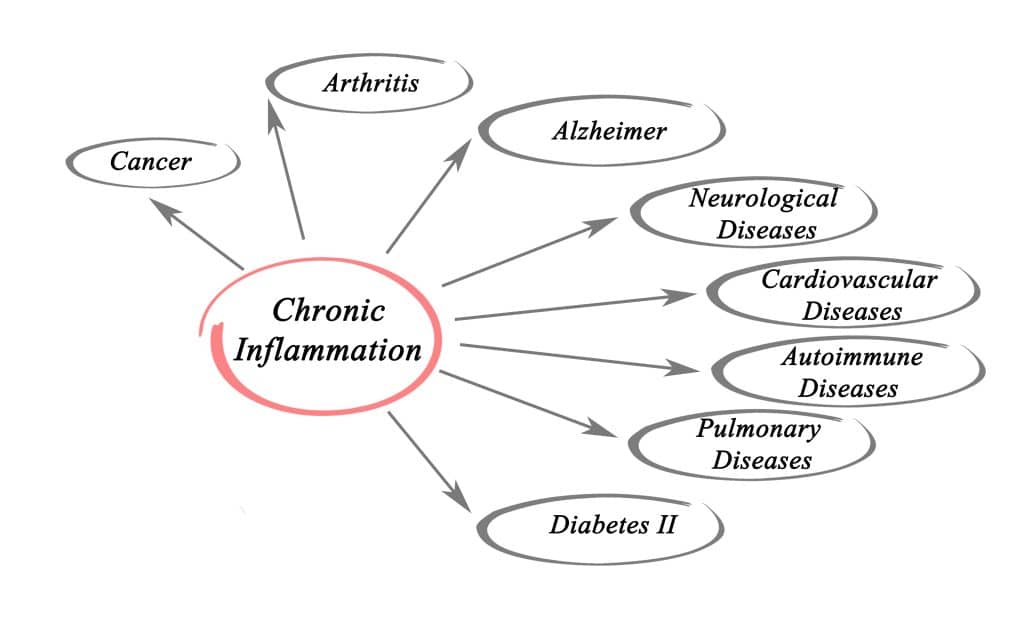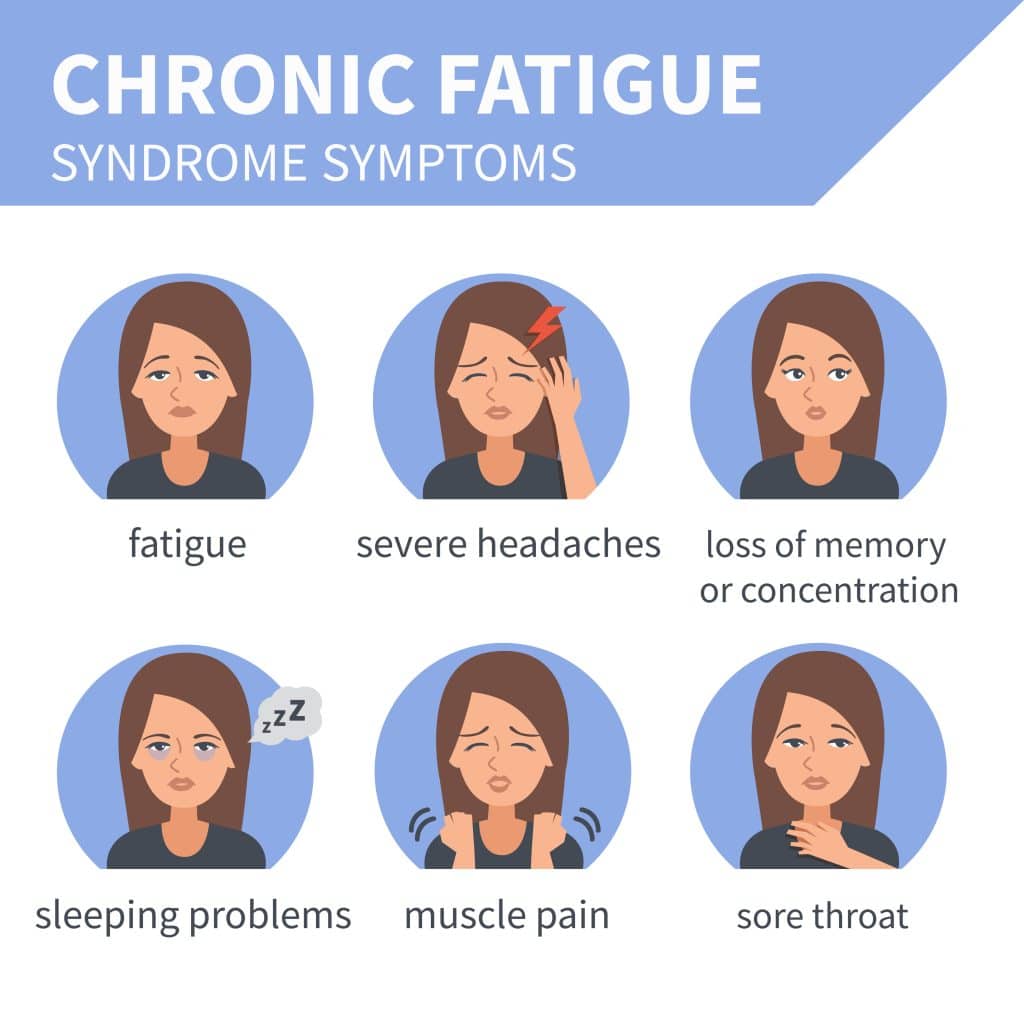What Causes Chronic Fatigue Syndrome – And How To Stop Being Tired All The Time
Let’s focus on what causes chronic fatigue syndrome and discuss solutions to this debilitating disease. Chronic fatigue syndrome is a complex condition that is characterized by extreme tiredness lasting at least 6 months which cannot be explained by any underlying medical condition.
In some cases, infection from the Epstein-Barr virus (EBV), human herpesvirus 6 (HHV-6), and mycoplasma causes chronic fatigue syndrome.1 2 3 These types of infections cause inflammation in the body, which can lead to fatigue or exhaustion. However, not everyone affected by these infections experiences chronic fatigue so there must be an additional trigger.
Other medical conditions that may contribute to chronic fatigue include hormonal imbalances, such as hypothyroidism; autoimmune diseases, such as lupus or rheumatoid arthritis; and mental health issues, such as depression and anxiety.4
Lifestyle factors may also play a role in chronic fatigue. Poor nutrition, inadequate rest, too much stress, lack of exercise, poor sleep quality or quantity, and inadequate hydration can all contribute to fatigue.
If you think you may have chronic fatigue syndrome, there is a blood test to diagnose the illness, but there aren’t any approved pharmaceutical drugs to address the issue.5
In any case, pharmaceutical drugs don’t address the core cause of disease, but rather, treat the symptoms of the disease.
What Causes Chronic Fatigue Syndrome – Inflammation
Inflammation causes chronic fatigue syndrome.6 This should come as no surprise, as inflammation is the driving force behind so many different diseases that are prevalent in modern society. In fact, more than 50% of all preventable deaths worldwide are caused by chronic inflammatory conditions.7
Some of the other diseases that are caused by chronic inflammation include cardiovascular disease, weight loss resistance, rheumatoid arthritis, asthma, and depression.8
Chronic fatigue syndrome is also directly related to gut inflammation. Specifically, individuals who suffer from chronic fatigue syndrome often suffer from irritable bowel syndrome as well.9 Since irritable bowel syndrome is tied directly to gastrointestinal inflammation, it is clear that chronic fatigue syndrome is an inflammatory-based disease.
Similarly, individuals suffering from chronic fatigue syndrome also suffer from neuroinflammation. In fact, the worse the neuroinflammation, the worse the symptoms of chronic fatigue.10

What Causes Chronic Inflammation?
Chronic inflammation can be caused by many different things, including unhealthy diets, environmental toxins, smoking, and stress. Unhealthy diets that are high in processed foods and low in antioxidants can cause a buildup of toxins in the body which can lead to chronic inflammation.
Environmental toxins such as air pollution and water contaminants may also contribute to chronic inflammation. Smoking is another major risk factor for chronic inflammation, as it can lead to a buildup of toxins in the bloodstream and damage cells throughout the body. Stress has also been linked to chronic inflammation, as it can cause an increase in certain hormones which cause inflammation.11
The first step to ending chronic fatigue syndrome is to remove the factors that are leading to chronic inflammation.

What Causes Inflammation At The Core – Toxins
Heavy metal toxicity is one of the most common underlying causes of chronic fatigue syndrome. Heavy metals such as mercury, lead, and arsenic can accumulate in the body over time as a result of environmental and occupational exposure.
Mercury toxicity has been directly linked to chronic fatigue syndrome.12 Mercury is found in silver amalgam dental fillings among other things, and exposure to mercury can lead to a wide range of symptoms including fatigue, depression, confusion, and memory loss. I know from experience, as it was mercury from dental fillings that caused my chronic fatigue syndrome as well as multiple chemical sensitivity, depression, and anxiety.
Lead toxicity is often linked to occupational exposures, such as working with paint or stained glass. Arsenic is naturally occurring in fruit, vegetables, and grains, but high levels of exposure can cause significant health issues.13
Chemicals and mold have also been linked to chronic fatigue syndrome. Pesticides, herbicides, fungicides, and other chemical exposures can disrupt the body’s natural detoxification processes and cause a range of symptoms including chronic fatigue.14 The presence of indoor molds can produce mycotoxins, which are chemicals that can cause symptoms such as chronic fatigue, headaches, and respiratory problems.15
In addition to chemicals, molds, and heavy metals, dietary intolerances can contribute to the development of chronic fatigue syndrome. Common food allergens such as dairy products, wheat gluten, corn, and soy can cause a wide range of symptoms including headaches, joint pain, and digestive issues.16 Eliminating these foods from the diet can help reduce symptoms of chronic fatigue syndrome.

What Causes Chronic Fatigue Syndrome – Hormonal Imbalances
Hormonal imbalances occur when there is an issue with the number of hormones produced by the endocrine glands or the cellular receptors become resistant to hormones. A number of factors can lead to hormonal imbalances, including stress, poor diet, lack of exercise, and heavy metal toxicity.17 So again, heavy metals and other toxins are the driving factors behind chronic fatigue syndrome.
Women with chronic fatigue syndrome have also been found to have higher levels of progesterone, specifically isopregnanolone, which can affect the brain’s serotonin levels and lead to feelings of depression and anxiety.18
What Causes Chronic Fatigue Syndrome – Hypothyroidism
Other hormones that may be involved in chronic fatigue syndrome include thyroid hormones, which regulate metabolism; adrenaline, which helps increase energy; and melatonin, which helps regulate sleep. Low levels of any of these hormones can contribute to fatigue and other symptoms associated with chronic fatigue syndrome.
Hypothyroidism is a condition in which the thyroid gland does not produce enough hormones or cellular receptors are resistant to thyroid hormones. It can lead to a variety of symptoms, including fatigue, weight gain, dry skin, constipation, depression, and anxiety.
Thyroid disorders like hypothyroidism are often caused by inflammation driven by toxin accumulation.19
Read more about thyroid disorders here.

What Causes Chronic Fatigue Syndrome – Autoimmune Diseases
Autoimmune disease and chronic fatigue syndrome go hand in hand. Autoimmune diseases, such as lupus, multiple sclerosis, and rheumatoid arthritis trigger the body’s immune system to attack its own cells rather than foreign invaders. As a result of this attack, inflammation leads to fatigue.
Inflammation driven by toxins is one of the main causes of autoimmune diseases.
Read more about autoimmune diseases here.
What Causes Chronic Fatigue Syndrome – Poor Nutrition
Poor nutrition may contribute to the development of chronic fatigue syndrome, as inadequate intake of essential vitamins and minerals can lead to deficiencies in important bodily functions. People with chronic fatigue syndrome have been found to have significantly lower levels of vitamins B6, B12, and folate than those without the disorder. Low intake of these vitamins can cause fatigue, poor concentration, muscle pain, and sleep disturbances.20
Additionally, insufficient dietary intake of omega-3 fatty acids along with excessive intake of omega-6 fatty acids found in seed-based oils has been linked to a higher risk of developing chronic fatigue syndrome. This is because consuming too many omega-6 fatty acids leads to inflammation.21

A Solution To Chronic Fatigue Syndrome
The solution to chronic fatigue syndrome and so many other illnesses is to reverse the inflammation that is causing it. In order to do that, we must identify the toxins in our environment that are resulting in inflammation, eliminate exposure to them, and remove them from the body. After that, we must set the inflammatory cycle back to the default state.
While most toxins will dissipate from the body after they are removed from the environment, certain toxins like heavy metals are nearly impossible to remove from the body once they are present. This is because they are extremely heavy and very hard to excrete.
When I was suffering from mercury toxicity, I came across a chelation strategy that effectively pulled mercury out of my cells, out of my brain, and out of my body. I have helped tens of thousands of people employ this heavy metal chelation strategy. In the end, the only solution to lasting health is to remove toxic heavy metals from the body.
Read more about the complete heavy metal chelation protocol.
Due to the complex ON/ONOO cycle, inflammation remains elevated even after heavy metals and other toxins have been removed from the body. Through the work of Dr. Martin Pall, I discovered that there are specific supplements that can re-regulate the ON/ONOO inflammatory cycle back to default.22
It is only after the toxins that cause inflammation and the inflammatory cycle have been reset that my patients experience lasting relief from inflammatory-based diseases like chronic fatigue syndrome.

What Causes Chronic Fatigue Syndrome
Inflammation that stems from toxins like heavy metals causes chronic fatigue syndrome. This means that it is imperative to identify these toxins and remove them from the body. After removing toxins, downregulating the cycle of inflammation can relieve symptoms of chronic fatigue syndrome and all other inflammatory-based conditions.
Read more about inflammation and how you can stop it for good.
References
1 Transcription factors operate across disease loci, with EBNA2 implicated in autoimmunity. Harley JB, Chen X, Pujato M, Miller D, Maddox A, Forney C, Magnusen AF, Lynch A, Chetal K, Yukawa M, Barski A, Salomonis N, Kaufman KM, Kottyan LC, Weirauch MT. Nat Genet. 2018 Apr 16. doi: 10.1038/s41588-018-0102-3. [Epub ahead of print]. PMID: 29662164.
2 King O, Al Khalili Y. Herpes Virus Type 6. [Updated 2022 Aug 8]. In: StatPearls [Internet]. Treasure Island (FL): StatPearls Publishing; 2022 Jan-. Available from: https://www.ncbi.nlm.nih.gov/books/NBK540998/
3 Razin S. Mycoplasmas. In: Baron S, editor. Medical Microbiology. 4th edition. Galveston (TX): University of Texas Medical Branch at Galveston; 1996. Chapter 37. Available from: https://www.ncbi.nlm.nih.gov/books/NBK7637/
4 Sapra, A., & Bhandari, P. (2022). Chronic Fatigue Syndrome. In StatPearls. StatPearls Publishing.
5 Biomarker for chronic fatigue syndrome identified. (2019, April 29). News Center. https://www.med.stanford.edu/news/all-news/2019/04/biomarker-for-chronic-fatigue-syndrome-identified.html
6 Jonsjö, M. A., Olsson, G. L., Wicksell, R. K., Alving, K., Holmström, L., & Andreasson, A. (2020). The role of low-grade inflammation in ME/CFS (Myalgic Encephalomyelitis/Chronic Fatigue Syndrome) – associations with symptoms. Psychoneuroendocrinology, 113, 104578. https://doi.org/10.1016/j.psyneuen.2019.104578
7 Furman D, Campisi J, Verdin E, Carrera-Bastos P, Targ S, Franceschi C, Ferrucci L, Gilroy DW, Fasano A, Miller GW, Miller AH, Mantovani A, Weyand CM, Barzilai N, Goronzy JJ, Rando TA, Effros RB, Lucia A, Kleinstreuer N, Slavich GM. 2019. Chronic Inflammation in the Etiology of Disease Across the Life Span. Nature Medicine. 25(12):1822–1832.
8 Inflammation. (n.d.). National Institute of Environmental Health Sciences. https://www.niehs.nih.gov/health/topics/conditions/inflammation/index.cfm
9 Lakhan, S. E., & Kirchgessner, A. (2010). Gut inflammation in chronic fatigue syndrome. Nutrition & metabolism, 7, 79. https://doi.org/10.1186/1743-7075-7-79
10 Nakatomi, Y., Mizuno, K., Ishii, A., Wada, Y., Tanaka, M., Tazawa, S., Onoe, K., Fukuda, S., Kawabe, J., Takahashi, K., Kataoka, Y., Shiomi, S., Yamaguti, K., Inaba, M., Kuratsune, H., & Watanabe, Y. (2014). Neuroinflammation in Patients with Chronic Fatigue Syndrome/Myalgic Encephalomyelitis: An ¹¹C-(R)-PK11195 PET Study. Journal of nuclear medicine : official publication, Society of Nuclear Medicine, 55(6), 945–950. https://doi.org/10.2967/jnumed.113.131045
11 Pahwa R, Goyal A, Jialal I. Chronic Inflammation. [Updated 2022 Aug 8]. In: StatPearls [Internet]. Treasure Island (FL): StatPearls Publishing; 2022 Jan-. Available from: https://www.ncbi.nlm.nih.gov/books/NBK493173/
12 Kern, J. K., Geier, D. A., Bjørklund, G., King, P. G., Homme, K. G., Haley, B. E., Sykes, L. K., & Geier, M. R. (2014). Evidence supporting a link between dental amalgams and chronic illness, fatigue, depression, anxiety, and suicide. Neuro endocrinology letters, 35(7), 537–552.
13 Rajkumar V, Lee VR, Gupta V. Heavy Metal Toxicity. [Updated 2022 Sep 18]. In: StatPearls [Internet]. Treasure Island (FL): StatPearls Publishing; 2022 Jan-. Available from: https://www.ncbi.nlm.nih.gov/books/NBK560920/
14 Mostafalou, S., & Abdollahi, M. (2013). Pesticides and human chronic diseases: evidences, mechanisms, and perspectives. Toxicology and applied pharmacology, 268(2), 157–177. https://doi.org/10.1016/j.taap.2013.01.025
15 Brewer, J. H., Thrasher, J. D., Straus, D. C., Madison, R. A., & Hooper, D. (2013). Detection of mycotoxins in patients with chronic fatigue syndrome. Toxins, 5(4), 605–617. https://doi.org/10.3390/toxins5040605
16 Manu, P., Matthews, D. A., & Lane, T. J. (1993). Food intolerance in patients with chronic fatigue. The International journal of eating disorders, 13(2), 203–209. https://doi.org/10.1002/1098-108x(199303)13:2<203::aid-eat2260130208>3.0.co;2-u
17 Rana S. V. (2014). Perspectives in endocrine toxicity of heavy metals–a review. Biological trace element research, 160(1), 1–14. https://doi.org/10.1007/s12011-014-0023-7
18 Murphy, B. E., Abbott, F. V., Allison, C. M., Watts, C., & Ghadirian, A. M. (2004). Elevated levels of some neuroactive progesterone metabolites, particularly isopregnanolone, in women with chronic fatigue syndrome. Psychoneuroendocrinology, 29(2), 245–268. https://doi.org/10.1016/s0306-4530(03)00026-x
19 Razvi S, Jabbar A, Bano A, Ingoe L, Carey P, Junejo S, Thomas H, Addison C, Austin D, Greenwood JP, Zaman AG. Triiodothyronine (T3), inflammation and mortality risk in patients with acute myocardial infarction. Eur Thyroid J. 2022 Feb 9;11(2):e210085. doi: 10.1530/ETJ-21-0085. PMID: 35007210; PMCID: PMC9142797.
20 Regland, B., Forsmark, S., Halaouate, L., Matousek, M., Peilot, B., Zachrisson, O., & Gottfries, C. G. (2015). Response to vitamin B12 and folic acid in myalgic encephalomyelitis and fibromyalgia. PloS one, 10(4), e0124648. https://doi.org/10.1371/journal.pone.0124648
21 University of Eastern Finland. (2019, January 15). Effects of linoleic acid on inflammatory response depend on genes. ScienceDaily. Retrieved January 8, 2023 from www.sciencedaily.com/releases/2019/01/190115124500.htm
22 Pall M. L. (2013). The NO/ONOO-cycle as the central cause of heart failure. International journal of molecular sciences, 14(11), 22274–22330. https://doi.org/10.3390/ijms141122274




